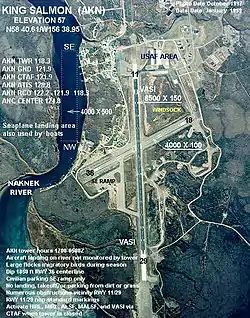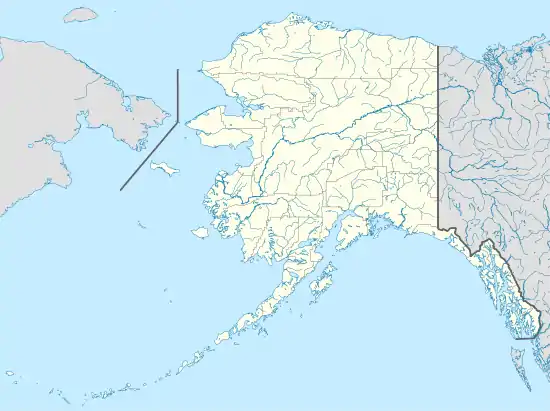King Salmon Airport
King Salmon Airport (IATA: AKN, ICAO: PAKN, FAA LID: AKN) is a state-owned public-use airport located just southeast of King Salmon, in the Bristol Bay Borough of the U.S. state of Alaska.[1] It was formerly the Naknek Air Force Base, named for its location near the Naknek River.
King Salmon Airport | |||||||||||||||
|---|---|---|---|---|---|---|---|---|---|---|---|---|---|---|---|
 | |||||||||||||||
| Summary | |||||||||||||||
| Airport type | Public | ||||||||||||||
| Owner | State of Alaska DOT&PF - Central Region | ||||||||||||||
| Serves | King Salmon, Alaska | ||||||||||||||
| Hub for | PenAir | ||||||||||||||
| Elevation AMSL | 73 ft / 22 m | ||||||||||||||
| Coordinates | 58°40′35″N 156°38′55″W | ||||||||||||||
| Map | |||||||||||||||
 AKN Location of airport in Alaska | |||||||||||||||
| Runways | |||||||||||||||
| |||||||||||||||
| Statistics (2011) | |||||||||||||||
| |||||||||||||||
As per Federal Aviation Administration records, the airport had 42,310 passenger boardings (enplanements) in calendar year 2008,[2] 40,637 enplanements in 2009, and 41,514 in 2010.[3] It is included in the National Plan of Integrated Airport Systems for 2011–2015, which categorized it as a primary commercial service airport (more than 10,000 enplanements per year).[4]
Facilities and aircraft
King Salmon Airport covers an area of 5,277 acres (2,136 ha) at an elevation of 73 feet (22 m) above mean sea level. It has two asphalt paved runways: 12/30 measuring 8,901 by 150 feet (2,713 × 46 m) and 18/36 measuring 4,017 by 100 feet (1,224 × 30 m).[1]
For the 12-month period ending August 12, 2011, the airport had 51,300 aircraft operations, an average of 140 per day: 66% general aviation, 32% air taxi, 2% scheduled commercial, and 1% military. At that time there were 42 aircraft based at this airport: 79% single-engine, 14% multi-engine, and 7% helicopter.[1]
Airlines and destinations
Passenger
| Airlines | Destinations |
|---|---|
| Alaska Airlines | Anchorage, Dillingham |
| Grant Aviation | Chignik, Chignik Lagoon, Chignik Lake, Dillingham, Levelock, Perryville, Pilot Point, Port Heiden, South Naknek, Ugashik Bay[5] |
| Katmai Air[6] | Brooks Camp |
Accidents and incidents
On June 30, 1985, Douglas C-47B N168Z of Northern Peninsula Fisheries was substantially damaged at King Salmon when both engines failed on approach while the aircraft was on an executive flight from Homer Airport, Alaska.[7] The cause of the accident was fuel exhaustion. A fuel filler cap was discovered to be missing after the accident.[8]
References
- FAA Airport Form 5010 for AKN PDF. Federal Aviation Administration. effective May 31, 2012.
- "Enplanements for CY 2008" (PDF, 1.0 MB). CY 2008 Passenger Boarding and All-Cargo Data. Federal Aviation Administration. December 18, 2009.
- "Enplanements for CY 2010" (PDF, 189 KB). CY 2010 Passenger Boarding and All-Cargo Data. Federal Aviation Administration. October 4, 2011.
- "2011–2015 NPIAS Report, Appendix A" (PDF). National Plan of Integrated Airport Systems. Federal Aviation Administration. October 4, 2010. Archived from the original (PDF, 2.03 MB) on September 27, 2012.
- "Destinations". (retrieved December 20, 2020)
- Bennett, Bo (2000). Rods & Wings. Anchorage: Publication Consultants. pp. 226–227. ISBN 9781888125627.
- "N168Z Accident description". Aviation Safety Network. Retrieved July 27, 2010.
- "NTSB Identification: ANC85FA112". National Transportation Safety Board. Retrieved July 27, 2010.
External links
- Topographic map from USGS The National Map
- FAA Airport Diagram for King Salmon (AKN) (PDF), effective January 28, 2021
- FAA Terminal Procedures for King Salmon (AKN), effective January 28, 2021
- Resources for this airport:
- FAA airport information for AKN
- AirNav airport information for PAKN
- ASN accident history for AKN
- FlightAware airport information and live flight tracker
- NOAA/NWS latest weather observations for PAKN
- SkyVector aeronautical chart for AKN